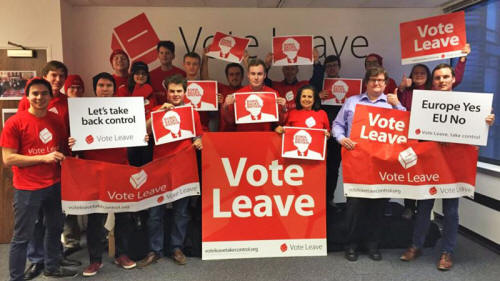|
by Joel Kotkin from TheDailyBeast Website
arises to the elites who keep explaining why changes that hurt the middle class
are actually for its own good.
It shares no single leader, party or
ideology. Its very incoherence, combined with the blindness of its
elite opposition, has made it hard for the established parties
across what's left of the democratic world to contain it.
For two decades, this new ruling class could boast of great successes:
Now, that's all fading or failing...
Amidst this, the crony capitalists and their bureaucratic allies have only grown more arrogant and demanding.
But the failures of those who occupy
what Lenin called "the commanding heights" are obvious to
most of the citizens on whose behalf they claim to speak and act.
Each of these strains appeals to
different constituencies, but together they are creating a
political Molotov cocktail.
Class Conflict
The London Times post-election analysis, notes socialist author James Heartfield, found the upper classes 57 percent for remain, the upper middle class fairly divided, while everyone below them went roughly two-thirds for leave.
It doesn't get much plainer than that.
The social status of the British worker, even among the Labour grandees who pay them lip service, has been greatly diminished, notes scholar Dick Hobbs, himself a product of blue collar east London.
As labor has struggled, writes Heartfield,
A similar scenario has emerged here in America, where corporations - especially those making consumer goods - have grown fat on access to Chinese, Mexican and other foreign labor.
Like their British counterparts, the U.S. working class is falling into social chaos, with,
Even during the primary campaign, as
both Sanders and Trump railed against
globalization,
United Technologies saw fit to
announce the movement of a large plant form Indianapolis, where
about 1,500 jobs were lost, to Monterrey.
In Britain, it never occurred to party's leaders that most new jobs created during the Blair and Brown regimes went to newcomers.
One can admire the pluck of Polish plumbers, Latvian barmaids, Greek waiters and French technicians and still note that many of these jobs could have gone to native born British.
This includes the children of the mostly
non-white commonwealth immigrants who are now part of the country's
national culture.
Only Trump and Sanders have attacked this program, which has cost even trained American workers their jobs.
Anti-EU continental Europeans - notably
in eastern Europe but also France's Marine Le Pen - often
outdo our TV billionaire's provocations.
The urban centers of London, Manchester
and Liverpool all voted Remain. Central London has benefited from
being where the world's super rich park their money. The devastation
of the industrial economy in the periphery has hardly touched the
posh precincts of the premier global city.
The Brexit vote, suggests analyst
Aaron Renn, demonstrated that arrogant urbanites, seeing
themselves as the exclusive centers of civilization, ignore those
who live outside the "glamour zone" at their own peril.
The suburbs are tilting that way, and
could become more rebellious as aggressive "disparate impact"
policies force communities to reshape themselves to meet HUD's
social engineering standards - for example if they are too middle
class or too white - even if there is no proof of actual
discrimination.
Already the small towns and outer
suburbs have signed up with Trump; if he can make clear the threat
to suburbia from the planners, he could, despite his boorish
ugliness, win these areas and the election.
Yet these national cultures also have
produced much of the world's great literature and music, and the
world's most beautiful cities. Yet in contemporary Europe, these
national cultures are diminishing. Instead the crony capitalist
regime gives us
Rem Koolhaas' repetitious
generic city, often as stultifying as the most mindless suburban
mall.
English students at Yale protest having
to read Chaucer, Shakespeare or Milton, the foundation writers of
the world's common language whose greatest sin, it appears, was to
be both English and male.
But everyone who shouts for the British national soccer team or chants USA at the Olympics is not a fascist; they are just people who love their country.
Yet academia, the shaper of the young and impressionable, now sometimes regard any positive assessment of America as the land of opportunity or even the American flag as "micro-aggressions."
Brits and Americans have much to be
ashamed about in their history, but their glorious achievements
remain inspirational to many, who find attempts to replace them with
some tortured global syncretism foolish and counterproductive.
In contrast, classes who supported remain,
...increasingly see themselves as
rightful rulers, the benighted masses be damned.
Since 2005 French, Danish and Dutch voters have voted against closer EU ties. Hostility to the EU, as recorded by Pew, is actually stronger in many key European countries, including France, than it is in Britain.
And after the Brexit vote, there are
already moves for similar exit referenda in several European
countries. But like Washington bureaucrats who can't be bothered to pay much attention to the views of the underlings of the Heartland, the Eurocrats want to double down.
The Germans, the effective rulers of Europe, have reacted to Brexit with talk about ways to "deepen" the EU, creating the basis for what some have argued would be essentially "a superstate".
This policy approach seems about as
brilliant as that of
Lord North,
whose response to American agitation was to further tighten London's
screws. That certainly worked well - bringing to mind Lord North,
who responded to colonial agitation by further tightening London's
screws.
The progressive ideal of government by experts - sometimes seen as "the technocracy" - may sounds good in Palo Alto or London, but often promise a dim future for the middle class.
Expert regulation, often with green
goals in mind, take hard-earned gains like car and home ownership
and cheap air travel all but out of reach for the middle class,
while keeping them around for the globe-trotting elites.
Libertarians hail de-regulation while
others, on the nationalist right, embrace the authoritarian
nationalism of Vladimir Putin.
The revels have put the issue of the super-state and the cause of returning power closer to the people back on the agenda.
The Great Rebellion allows
localities relief from overweening regulations, cities to be as
urban as they want, and the periphery choose how they wish to
develop.
Our hope on race and ethnicity lies not
in rule-making from above, but in allowing the multiculturalism of
the streets to occur, as is rapidly does, in suburban schoolyards,
soccer pitches and Main Streets across the Western world.
In Texas, California, and across the southwestern, Spanish phraseology, Mexican food and music are already very mainstream. Without lectures from the White House or preening professors, African-American strains will continue to define our national culture, particularly in the south.
In Europe, few object to couscous on
bistro menus, falafel on the streets and, in Britain, the obligatory
curry at the pub.
We can now once again aspire to a better world - better because it will be one that people, not autocrats, have decided to make...
|



